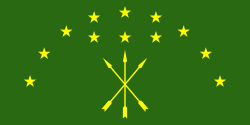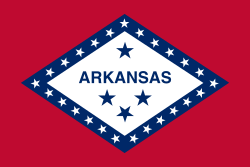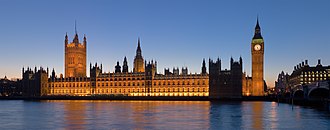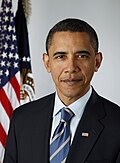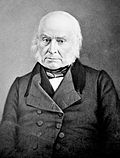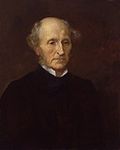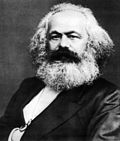
Back Portal:Politik ALS بوابة:السياسة Arabic بوابة:سياسة ARZ Портал:Политика Bulgarian প্রবেশদ্বার:রাজনীতি Bengali/Bangla Portal:Politika BS دەروازە:سیاسەت CKB Portál:Politika Czech Portal:Politik German Portal:Siyaset DIQ
| Main | Topics and categories | Tasks and projects |
The Politics portal

Politics (from Ancient Greek πολιτικά (politiká) 'affairs of the cities') is the set of activities that are associated with making decisions in groups, or other forms of power relations among individuals, such as the distribution of status or resources. The branch of social science that studies politics and government is referred to as political science.
Politics may be used positively in the context of a "political solution" which is compromising and non-violent, or descriptively as "the art or science of government", but the word often also carries a negative connotation. The concept has been defined in various ways, and different approaches have fundamentally differing views on whether it should be used extensively or in a limited way, empirically or normatively, and on whether conflict or co-operation is more essential to it.
A variety of methods are deployed in politics, which include promoting one's own political views among people, negotiation with other political subjects, making laws, and exercising internal and external force, including warfare against adversaries. Politics is exercised on a wide range of social levels, from clans and tribes of traditional societies, through modern local governments, companies and institutions up to sovereign states, to the international level.
In modern states, people often form political parties to represent their ideas. Members of a party often agree to take the same position on many issues and agree to support the same changes to law and the same leaders. An election is usually a competition between different parties.
A political system is a framework which defines acceptable political methods within a society. The history of political thought can be traced back to early antiquity, with seminal works such as Plato's Republic, Aristotle's Politics, Confucius's political manuscripts and Chanakya's Arthashastra. (Full article...)
Selected article
The Hungarian Revolution of 1956 was a spontaneous nationwide revolt against the Neo-Stalinist government of Hungary and its Soviet-imposed policies, lasting from 23 October until 10 November 1956. It began as a student demonstration which attracted thousands as it marched through central Budapest to the Parliament building. The revolt spread quickly across Hungary, and the government fell. Thousands organized into militias, battling the State police force and Soviet troops. The new government formally disbanded the State police force, declared its intention to withdraw from the Warsaw Pact and pledged to re-establish free elections. On 4 November, a large Soviet force invaded Budapest using artillery and air strikes, killing thousands of civilians. Organized resistance ceased by 10 November 1956, and mass arrests began. An estimated 200,000 Hungarians fled as refugees. By January 1957 the new Soviet-installed government had suppressed all public opposition. Soviet actions alienated many Western Marxists, yet strengthened Soviet control over Eastern Europe, cultivating the perception that communism was both irreversible and monolithic. Public discussion about this revolution was suppressed in Hungary for over 30 years, but since the thaw of the 1980s it has been a subject of intense study and debate.
Featured picture

George John Douglas Campbell, 8th Duke of Argyll KG, KT, PC, FRS, FRSE (30 April 1823 – 24 April 1900), styled Marquess of Lorne until 1847, was a Scottish peer, Liberal politician as well as a writer on science, religion, and the politics of the 19th century.
Selected quote
Selected biography
David Lewis (1909–1981) was a Russian-born Canadian Rhodes Scholar, labour lawyer and social democratic politician. He was national secretary of the Co-operative Commonwealth Federation from 1936 to 1950. As the United Steelworkers of America’s legal counsel in Canada, he played a central role in the creation of the Canadian Labour Congress in 1956 and in the New Democratic Party (NDP)'s formation in 1961. In 1962, he was elected as a Member of Parliament. He was the NDP's leader from 1971 to 1975. After his defeat in the 1974 Canadian election, he retired from politics. He spent his last years as a university professor and a newspaper travel correspondent. In retirement, he was named to the highest level of the Order of Canada for his political service. After a lengthy battle with cancer, he died in 1981.
Did you know (auto-generated) -

- ... that after its merger with India, the last raja of Jubbal State joined the Indian Foreign Service?
- ... that Philipp Tanzer has been an army medic, artist, firefighter, hairdresser, massage therapist, festival organiser, political candidate and gay porn star?
- ... that even though the Legislative Assembly of Quebec ordered a monument of Maurice Duplessis in front of its building, later premiers hid it for 16 years to avoid political tensions?
- ... that Sears heiress Edith Rosenwald Stern organized a women's broom brigade against political corruption in New Orleans?
- ... that Patricia Grace did not intend for her novel Potiki, about the impact of land development on an indigenous community, to be seen as political?
- ... that political philosophy professor Werner J. Dannhauser was the basis for a character in a Saul Bellow novel?
More did you know...
- ...that the phrase "lipstick on a pig" may have its origins in the 18th-century expression "A hog in armour is still but a hog"?
- ...that the Pirate Party of the United States was formed after a 2006 raid by the Swedish police on the servers of The Pirate Bay, a popular file sharing website?
- ...that Andrey Kirillovich Razumovsky, at the time Ambassador of the Russian Empire to the Austrian Empire, commissioned three string quartets from Beethoven?
- ...that the Zimbabwe Human Rights NGO Forum recorded over 1,200 violations of human rights in Zimbabwe by the law enforcement agencies from 2001 to September 2006?
- ...that the ideology of the Romanian National Renaissance Front has been described as "operetta fascism"?
- ...that in the 1984 Brown v. Hotel and Restaurant Employees case, the U.S. Supreme Court upheld a New Jersey gaming law requiring union leaders to be of good moral character?
- ...that the New Zealand McGillicuddy Serious Party wanted to return to a medieval lifestyle and establish a monarchy based on the Scottish Jacobite line?
- ...that tiao-kuai is the quasi-federal administration system in China?
In this month
- June 28, 2004 - Canadian federal elections occur; the Liberal party loses its absolute majority.
News and Current events
- August 11: 4 local government areas in New South Wales, Australia locked down after COVID-19 case
- August 11: Australia: AstraZeneca vaccine access expanded by Victorian government
- August 1: Australia: Victorian lockdown lifted
- July 29: Tunisia's president dismisses prime minister, suspends parliament
- July 25: Australia: Wikinews interviews Reg Kidd, mayor of the City of Orange, about COVID-19 lockdown and local government
- July 23: South Australia enters week-long lockdown to contain COVID-19 Delta variant spread
- July 21: Technological University Dublin senior lecturer Dr Lorcan Sirr speaks to Wikinews on housing market in Ireland
- July 21: Three rural councils in New South Wales, Australia enter 7-day lockdown
- July 21: Australia: Victoria lockdown extended by a week with 85 active cases recorded
- July 15: California governor signs new state budget, eligible Californians to get stimulus payments
Topics and categories
General images
Related portals
Associated Wikimedia
The following Wikimedia Foundation sister projects provide more on this subject:
-
Commons
Free media repository -
Wikibooks
Free textbooks and manuals -
Wikidata
Free knowledge base -
Wikinews
Free-content news -
Wikiquote
Collection of quotations -
Wikisource
Free-content library -
Wikiversity
Free learning tools -
Wiktionary
Dictionary and thesaurus
Sources
More portals
© MMXXIII Rich X Search. We shall prevail. All rights reserved. Rich X Search









